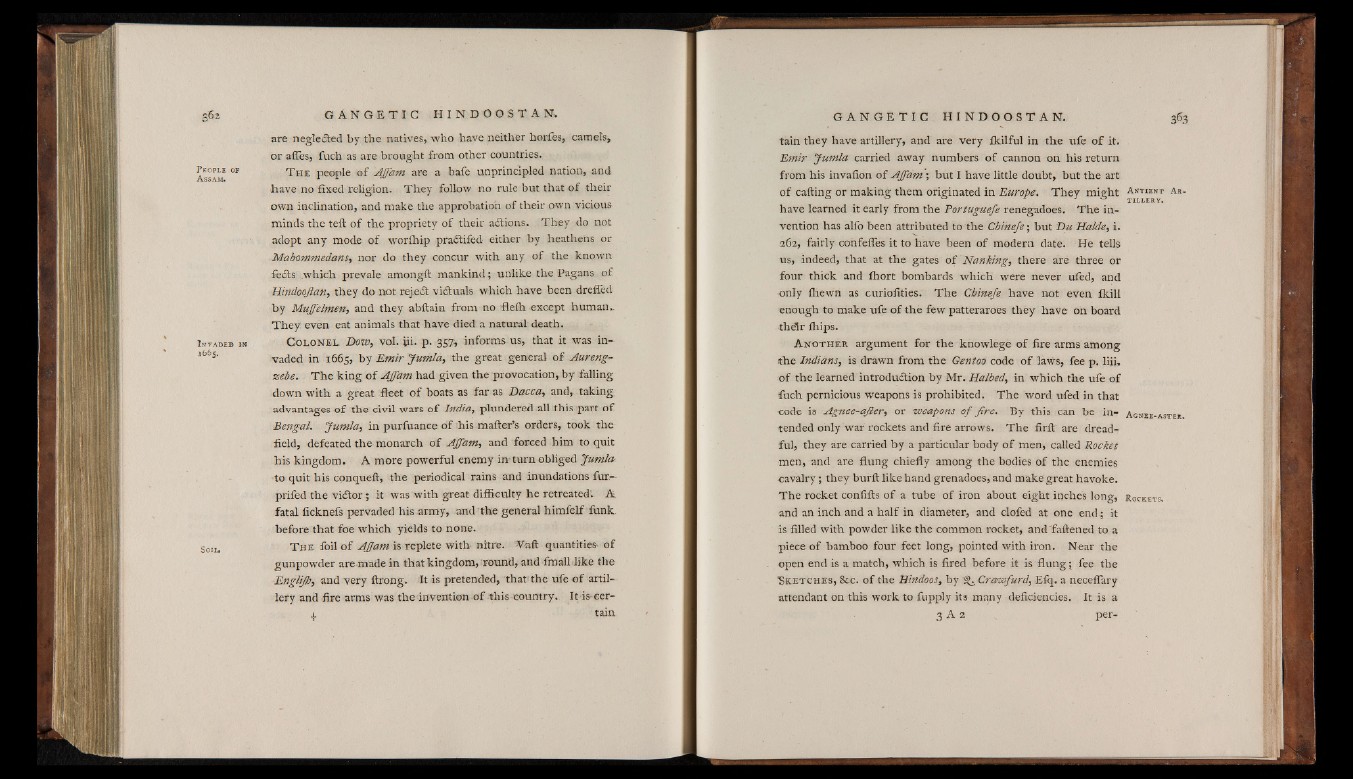
P eople of
A s s a m .
I nvaded jn
1665.
are neglected by the natives, who have neither hories, camels*
or affes, fuch as are brought from other countries.
T he people of AJJam are a bafe unprincipled nation, and
have no fixed religion. They follow no rule but that of their
own inclination, and make the approbation of their own vicious
minds the teft o f the propriety of their actions. They do not
adopt any mode of worihip prailifed either by heathens or
Mabommedans, nor do they concur with any of the known
fedts .which prevale amongft mankind; unlike the Pagans of
Hindoojlan, they do not rejedt victuals which have been drefled
by MuJJelmen, and they abftain from no flelh except human..
They even eat animals that have died a natural death.
C o lo n e l D ow, vol. jji. p. 357, informs us, that it was invaded
in 1665, by Emir Jumla, the great general o f Aureng-
zebe. The king of AJJam had given the provocation, by falling
down with a great fleet of boats as far as Dacca, and, taking;
advantages of the civil wars o f India, plundered all this part of
Bengal. Jumla, in purfuance of his mailer’s orders, took the
field, defeated the monarch o f AJJam, and forced him to quit
his kingdom. A more powerful enemy in-turn obliged Jumla-
to quit his conqueft, the periodical rains and inundations fur-
prifed the viito r; it was with great difficulty he retreated'.- A.
fatal ficknefs pervaded his army, and the general himfelf funk
before that foe which yields to none.
T he foil o f AJJam is replete with- nitre. Vaft quantities- of
gunpowder are made in that kingdom, round, and fmall like the
Englijh, and very ftrong. It is pretended, that-the ufe o f artillery
and fire arms was the invention of this-country. It is-eer-
4. tain
tain they have artillery, and are very ikilful in the ufe o f it.
Emir Jumla carried away numbers of cannon on his return
from his invafion o f AJJam ; but I have little doubt, but the art
o f cafting or making them originated in Europe. They might a n t ie n t A r- 7ILLER V.-
have learned it early from the Portugueje renegadoes. The invention
has alfo been attributed to the Cbineje; but Du Halde, i.
262, fairly confefles it to have been of modern date. He tells
us, indeed, that at the gates o f Nanking, there are three or
four thick and ihort bombards which were never ufed, and
only ihewn as curiofities. The Cbineje have not even fkill
enough to make ufe of the few patteraroes they have on board
their ihips.
A nother argument for the knowlege o f fire arms among
the Indians, is drawn from the Gentoo code o f laws, fee p. liii.
o f the learned introduilion by Mr. Halbed, in which the ufe of
fuch pernicious weapons is prohibited. The word ufed in that
■code is Agnee-ajler, or weapons of Jire. By this can be in- A g n e e - a s t e r .
tended only war rockets and fire arrows. The firit are dreadful,
they are carried by a particular body of men, called Rocket
men, and are flung chiefly among the bodies of the enemies
cavalry; they burft like hand grenadoes, and make great havoke.
The rocket confifts o f a tube of iron about eight inches long, R o c k e ts .
and an inch and a half in diameter, and clofed at one end 4 it
is filled with powder like the common rocket, and'fattened to a
piece o f bamboo four feet long, pointed with iron. Near the
open end is a match, which is fired before it is flung; fee the
S ketches, & c. of the Hindoos, by %, Crawfurd, Efq. a neceffary
attendant on this work to fupply its many deficiencies. It is a
3 A 2 „ per